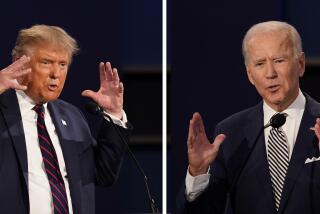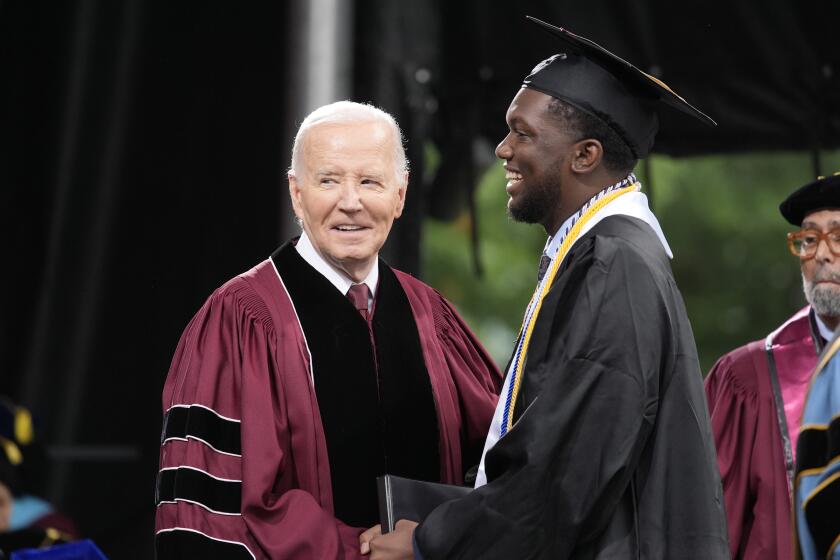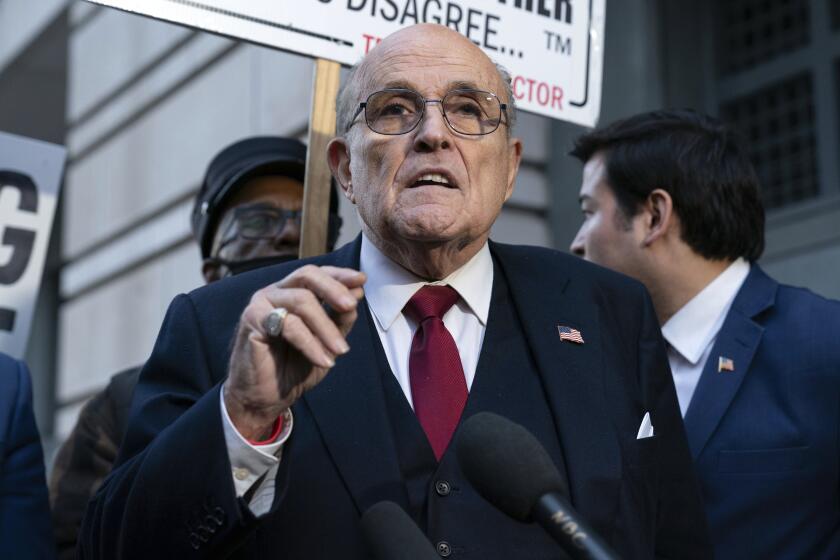Rice and the press make it unclear
AMERICAN leaders are particularly bad at defending the indefensible, and our news media usually do an even worse job of reporting on their efforts.
This is not to say that U.S. officials are any less hypocritical than those of any other nation. It’s just that the contemporary American political style places such a disproportionate emphasis on feigned sincerity that our public men and women rarely acquire the facility for the sort of effortlessly polished deceit and denial that is required to carry off hypocrisy as high policy. As Yeats put it:
A statesman is an easy man,
He tells his lies by rote;
Most American journalists deal poorly with governmental and corporate hypocrisy and duplicity for a couple of reasons. The antidote to official doublespeak is context and the acknowledgment of contradiction, but making that part of your reporting requires a certain amount of mental effort and a willingness to hold more than the next deadline in mind. Pointing out that what a powerful person says today contradicts what they said yesterday or what others of equal authority have said risks making a story seem contentious. Far safer to make a fetish of that faux-fairness that housebreaks reporting by rendering it a subset of stenography.
Take, for example, this week’s coverage of Secretary of State Condoleezza Rice’s pirouettes from one European capital to another, vainly attempting to simultaneously deny and justify the Bush administration’s embrace of torture as state policy.
The Washington Post’s editorial page, which has been a rare voice of clarity and moral sanity on this issue, got the matter exactly right Tuesday when it described Rice as employing “the same legalistic jujitsu and morally obtuse double talk that led the Bush Administration into a swamp of human rights abuses in the first place. Ms. Rice insisted that the U.S. government ‘does not authorize or condone torture’ of detainees. What she didn’t say is that President Bush’s political appointees have redefined the term ‘torture’ so that it does not cover practices, such as simulated drowning [‘water boarding’ is the grisly term of art], mock execution and ‘cold cells’ that have long been considered abusive by authorities such as her State Department.”
But by Thursday even the Post’s reports heralded Rice’s efforts to “clarify” the U.S. position while stories in The Times and elsewhere recorded her failure to “clarify” what the administration was up to. What was generally missing from all these reports was the context that would have pointed readers toward the truth.
Fact: As the Post previously has reported, the United States has been operating a network of clandestine CIA prisons in Eastern Europe and elsewhere, where suspected terrorists and adherents of Islamo-fascism are tortured.
Fact: U.S. intelligence agents have repeatedly kidnapped people and handed them over to third countries to be tortured in a process called “extraordinary rendition.”
Fact: As the New York Times has reported, U.S. officials believe that information obtained from one of Al Qaeda’s most infamous operatives -- Khalid Sheik Mohammed, who planned the 9/11 atrocities -- cannot be used in American legal proceedings because it was obtained by torture. Similarly, false information regarding purported links between Al Qaeda and Saddam Hussein, which the administration used to make the case for invading Iraq, was obtained under torture from another terrorist, Ibn Al-Shaykh al-Libi, who was captured by the CIA in Afghanistan and turned over to the Egyptians for interrogation.
Fact: As the Post’s editorial pointed out, Rice continues to argue that “ ‘It is also U.S. policy that authorized interrogation will be consistent with U.S. obligations under the Convention Against Torture, which prohibit cruel, inhuman or degrading treatment.’ What she didn’t explain is that, under this Administration’s eccentric definition of ‘U.S. obligations,’ cruel, inhuman and degrading treatment is not prohibited as long as it does not occur on U.S. territory.”
Eccentric? Sinister would seem the more apt adjective.
That was pointed out more than a week ago in an essay in the Wall Street Journal. The author was not an ACLU spokesman or functionary of Amnesty International but Abraham D. Sofaer, who was the legal advisor to the State Department under Presidents Reagan and George H.W. Bush and who presented the torture convention to the U.S. Senate for ratification in 1990.
Now the George P. Shultz Fellow at the Hoover Institution, Sofaer called the administration’s interpretation of the convention plainly “wrong. It has created confusion in the field, and it exposes the president and the nation to criticism.... While the administration says that the post-9/11 world demands greater flexibility to use ‘cruel, inhuman or degrading’ pressure or punishment, the convention includes a provision that precludes this argument: ‘No exceptional circumstances whatsoever, whether a state of war or a threat of war, internal political instability or any other emergency, may be invoked to justify torture.’ ... The notion that the conduct of the enemies we face is so lawless that we should make exceptions to the normal rules is a formula for subjectivity and lawlessness.”
Had all these facts and voices of rational authority -- like Sofaer’s -- been made part of the day-to-day reporting on Rice’s tour, all her deliberate ambiguity would have come into focus for what it was: a convoluted defense of the indefensible.
As the neurologist and essayist Oliver Sacks has pointed out, ours is an intellectual era marked by a general increase in a factual knowledge and a general decline in understanding. In other words, we know more and more but comprehend less and less about what any of it really means.
Contemporary journalism has had a major hand in this, and the push grows harder as corporate proprietors embrace a “business model” that reduces journalism to “content” to be distributed across as many “platforms” as quickly and as entertainingly as possible. (Don’t you love those terms -- so empirical sounding, yet so empty of meaning.)
To call this folly -- and it is that -- is not to argue for an ideological journalism that conforms to the personal agendas of reporters or their editors. Rather, it’s a recognition that a journalism that genuinely serves the public interest refuses to mindlessly recite just what government officials and their spokesmen said today, that does the hard work of putting facts in context and of acknowledging the reality that exists beyond official announcements and staged media events. (Why do you think Bush and Vice President Dick Cheney have chosen to deliver their recent defenses of the war in Iraq before uniformed military audiences?)
Finally, a useful journalism recognizes that the world was not created afresh each day -- that history does, in fact, exist and matter. But, apart from its editorial pages, that journalism restrains itself from reaching conclusions, making it possible for its readers, viewers and listeners to draw rational ones for themselves. (Those who tried to follow most of this week’s coverage of Rice’s European tour would have been hard-pressed to do that.)
Insisting that people have a right to demand that their news media tell them what they need to know to reach the conclusions that make responsible citizenship possible is a sturdy, old-fashioned sort of notion, kind of a traditional values thing.
In that spirit, there’s even a general proposition lurking here: Facts plus context equal truth -- if you want to know it and are willing to wonder why others think you shouldn’t.
More to Read
Get the L.A. Times Politics newsletter
Deeply reported insights into legislation, politics and policy from Sacramento, Washington and beyond. In your inbox three times per week.
You may occasionally receive promotional content from the Los Angeles Times.






